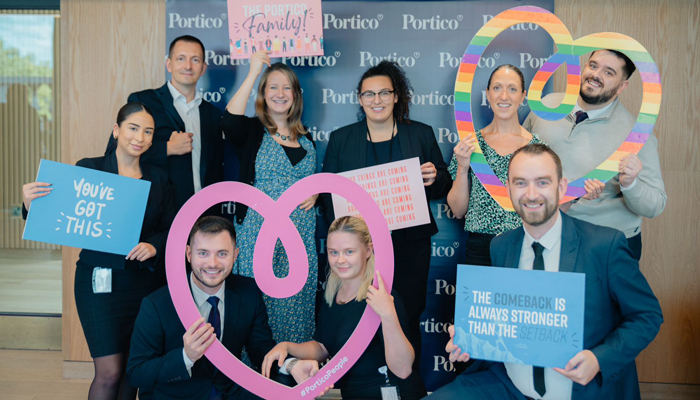5 reasons to be optimistic about hospitality recruitment in 2023


By Oliver Hiner, operations director, Portico
The UK hospitality sector is not alone in facing recruitment challenges.
There are a huge number of vacancies, but at the same time we are seeing unemployment rates increase across the country, in large part due to a not insignificant part of the workforce deciding not to come back to work following the pandemic.
This goes for both ends of the generational spectrum. Many over 50s have taken stock and decided that a partial or full return to work is not aligned with their priorities, while some from younger generations are taking their chances and combining work with their travels.
Hospitality, in particular, has been hit hard. More than 660,000 jobs were lost during the pandemic, and with society now fully open again, there are some 400,000 employment gaps to be filled.
A key priority for the sector, therefore, is to recruit people back into the trade while retaining the talent we already have – this can only be done by better distinguishing hospitality as a career of choice.
Fortunately, we are seeing many positive changes in the guest services industry that are helping to cement it as a desirable option for prospective employees. Here are five such trends that should help to boost FM and hospitality recruitment through 2023 and beyond.
Opportunities are expanding
As the return to the office continues, there are going to be more opportunities throughout 2023 to devise innovative ways to present guest services beyond what the service was pre-pandemic.
Back then, guest services in the corporate world rarely went beyond the reception team. Now, we are seeing roles grow continuously as front-of-house companies find new ways to support their clients. For those with an entrepreneurial spirit, guest services will serve them well.
There are very few barriers to entry
Hospitality brings together diverse teams of people from all walks of life better than any other sector.
Diversity, equity and inclusion is a fundamental part of the modern workplace, and guest services are already renowned as providing an inclusive and equitable workplace for employees of all backgrounds.
Moreover, as university becomes more expensive with changes to loan repayments, it is important to ensure young people know there are a wide range of roles available to them after school that don’t require a degree. Hospitality is one of the rare industries that doesn't require higher education certificates for entry – so, for those who are keen to get to work, the guest services door will always be open.
And for those who do have degrees under their belts, hospitality still offers a highly rewarding, long-term career path with bountiful opportunities. This is a great sector for getting stuck into a business and gaining managerial experience of how real-world enterprises function.
Hospitality can open doors
Because of this, we have to accept that working in our sector inevitably provides people with the skills and experience they need to thrive in a host of other ventures.
Indeed, as much as we would like all our employees to come into the guest services industry and stay in the family forever, it is equally important to recognise that this line of work can be a great steppingstone into others.
With guest services in particular, colleagues are exposed to a range of clients that all do different things. By being involved in their front of house function, employees can naturally observe their businesses operations and have their mind opened to new possibilities.
The work is sociable
One of the best attractions of the guest services world is how sociable it is. Sometimes, work doesn’t feel like work, simply because we spend our time interacting and making others smile. A typical day or evening in FM and hospitality is spent meeting with and talking to people and collaborating with the rest of the team.
Furthermore, with the trend towards flexible working patterns gathering momentum, there are roles within the sector which can fit around all kinds of other commitments and priorities.
Guest services, for example, can still be the traditional 9-5 – but what we are seeing is a breaking away from tradition and offering of a new way of working that can suit the client and employees’ lifestyles as well.
In-work benefits are improving
That breaking away from tradition also trickles into job security. Hospitality roles have been traditionally viewed as unsecure, with zero-hour contracts and very little by way of benefits.
However, this is changing. The hospitality industry had to bounce back after the pandemic, and this includes guest services. It was a time of reflection and recalibration for many sector business leaders – there was a real shift in perspectives as companies realised that their front-of-house team were invaluable.
Focus on benefits and wellbeing has therefore intensified. At most of our client sites, our Portico staff will have access to the same benefits as the client’s own staff, which can include but is not limited to free hot lunches, enhanced sick leave and holiday leave, and private healthcare.
Additionally, we are seeing more and more professional development and training pathways develop within the industry. For any guest services company, retaining talent is such an important part of successful service delivery – offering colleagues the opportunity to grow and develop is therefore critical to futureproofing hospitality organisations.
Without doubt, this decade has and will continue to be challenging for the broader hospitality trade.
Guest services companies are a people-driven businesses that cannot function without a pool of dedicated, eager, personable employees to represent their brands and what they stand for.
At Portico, rather than bury our heads in the sand, we think now is the time to beat the hospitality drum and build an even more positive case for new talent to pursue a career with us.
Add your comment



